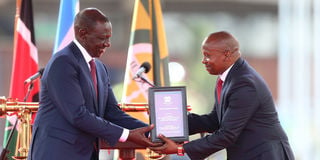Kenya’s problem was not the Deputy President

President William Ruto hands over the Constitution of Kenya to Deputy President Kithure Kindiki following Kindiki's swearing-in at the Kenyatta International Convention Centre (KICC), Nairobi on November 1, 2024.
The structural weaknesses in Kenya’s governance framework are emblematic of a deeper malaise rooted in patronage networks, institutional decay and a pervasive culture of impunity. At the heart of these challenges lies corruption.
Corruption in Kenya is systemic, serving as the currency of political loyalty and the means by which power is consolidated. To dismantle this entrenched system, a radical reconstitution of the anti-corruption architecture is imperative.
Institutional fragility further compounds the governance crisis. Key pillars of democracy, such as the Judiciary and the electoral commission, have often been subverted for partisan interests, thereby undermining their legitimacy. The lack of institutional autonomy has rendered these bodies susceptible to manipulation, eroding public confidence in them. Restoring institutional integrity demands a recalibration of the constitutional order and stringent mechanisms for accountability.
The inefficacy of public service underscores the governance deficit that plagues the Kenyan state. The bureaucracy is often characterised by inertia, inefficiency and a lack of responsiveness to the needs of the citizenry. The deployment of e-governance platforms, performance-based management systems and the decentralisation of service delivery are a good start though.
Political instability remains a persistent challenge, exacerbated by the instrumentalisation of ethnic identities for political mobilisation. Was it a must for the Deputy President to come from the Mt Kenya region? Prof Kithure Kindiki was the best for Kenya Kwanza not the best for the country. The cyclical nature of electoral violence is indicative of a political culture steeped in exclusionary practices and zero-sum calculations of power.
Economic mismanagement further entrenches the governance malaise, with fiscal profligacy, unsustainable debt levels, and rent-seeking behaviour stifling economic growth and exacerbating socio-economic inequalities.
Lastly, the normalisation of impunity, particularly among the political elite, has created a governance environment where accountability is the exception rather than the rule.
These are the issues Kenya Kwanza should be prioritising, not the impeachment of the DP.
Jomba Eugine B., Kibabii University




